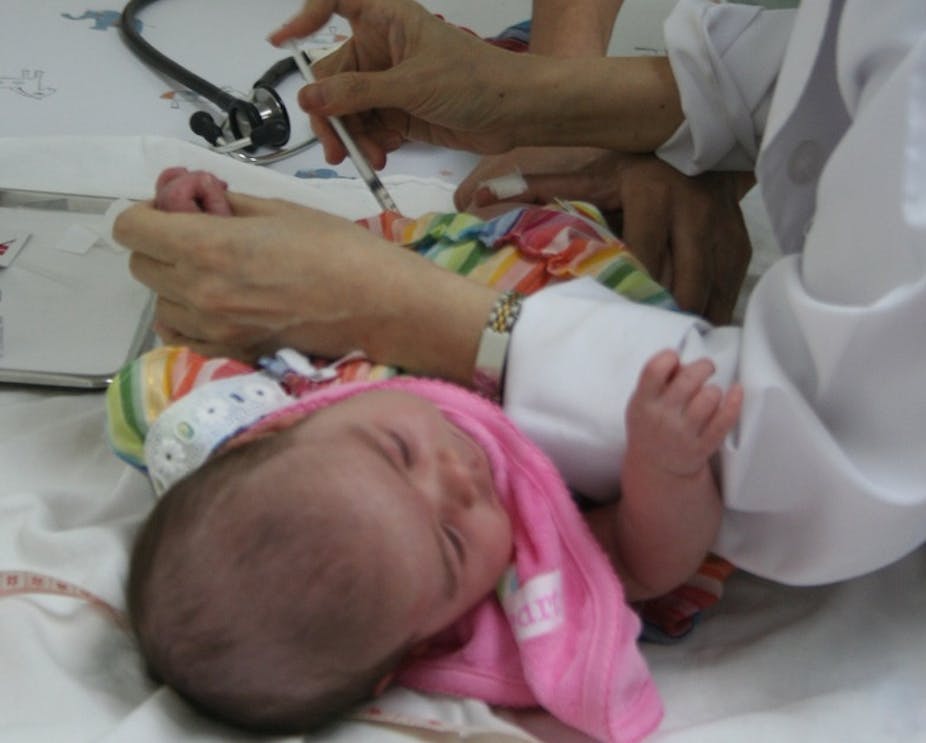The lack of scientific literacy in the media causes much harm to public understanding of the role and importance of vaccines. The latest instance revives the same old fears using the same formula that so many such stories use.
I’ve been writing about the anti-vaccine movement in Australia for a while now so I’ve heard most of the arguments designed to discourage parents from vaccinating their kids.
The usual narrative claims vaccines contain toxic ingredients, they’ve never been tested and cause all kinds of horrible diseases. All of this is usually wrapped up in an emotive story designed to scare you.
Sadly, it seems some of this scaremongering is making headway. We are now seeing the resurgence of several vaccine preventable diseases around the world, including measles, whooping cough and even diphtheria, which killed an unvaccinated 22-year-old in Brisbane recently.
So it wasn’t a surprise to see some of these canards re-emerge in an article that appeared in the Fairfax press in Sydney yesterday and in Melbourne today where the author attempts to revive the age-old story of vaccines causing autism.
She gets a few things wrong which shouldn’t go unaddressed.
Misunderstandings
The author discusses the compensation case of a Hannah Poling, a girl who suffered a vaccine reaction and was compensated by the United States government for vaccine injuries.
Despite the author’s claims, Hannah did not lapse into autism. Instead, her rare genetic mitochondrial disorder was deemed to be exacerbated by vaccination, leading to the development of a seizure disorder with some autism-like symptoms.
The case was publicised as proof that vaccines cause autism but this is clearly not true. Rather, it reflects the lack of scientific literacy in the media and the continuing desire for anti-vaccine advocates to find a vaccine culprit.
It’s also important to note that legal evidence and scientific evidence are very different kettles of fish.
To prove something in a court requires only slightly more than 50% proof – described as 50% and a feather – unlike the scientific method. The latter is firstly not based on the quality of your argument and requires much greater proof than a bit more than 50%.
While the US Vaccine Injury Compensation Program serves an essential purpose to compensate people who suffer permanent injuries from vaccination, it’s judgements are not about causality in the scientific sense.
We don’t often hear their stories above the shouting of the anti-vaxers but these reactions do happen which is why courts such as these exist in 19 countries (Australia does not yet have one).
The US courts also provide compensation to protect vaccine manufacturers from being sued out of business, and as much as you might not care for Big Pharma they do serve an essential role.
Revisiting autism
When it comes to scientific proof for vaccines causing autism, there simply isn’t any of good quality. But the possibility of the link has been studied extensively.
Indeed, the largest study to look for a link between the MMR vaccine and autism involved all children born in Denmark from January 1991 through December 1998 of which 82% had received the MMR vaccine.
The study found there was no link between the MMR vaccination and the development of autism.
More recently, the Institute of Medicine in the United States also looked for the risk of adverse events of eight vaccines, including the MMR.
It concluded “few health problems are caused by or clearly associated with vaccines”.
Yes, autism rates continue to rise and although we are not certain why, one factor contributing to this rise is better diagnosis.
Thimerosal – a mercury containing component of vaccines that was removed in 2000/2001 – was once thought to be a culprit. But if it were a factor, you would expect a decline in autism rates after it’s use was discontinued.
Instead, the opposite is true.
But there’s no shortage of stories about children lapsing into autism following vaccination – America’s most famous anti-vaxer Jenny McCarthy has told hers many times from the set of high profile talk shows like Oprah and Larry King Live and in her books.
Curiously, her son Evan has apparently recovered despite there being no known cure for autism.
All this is not intended to detract from the devastation that a diagnosis of autism can cause for parents.
Autism is often diagnosed at around the same time as kids start to receive several vaccinations, making these two events coincidental. This is a temporal link rather than a causal one.
Indeed, there’s a subset of parents who are angry at anti-vaccine lobbyists for directing the focus to vaccines, away from finding the true causes of autism.
But in the meantime, scaremongering is putting kids at risk of suffering from vaccine preventable diseases. And that’s not helping anyone.

